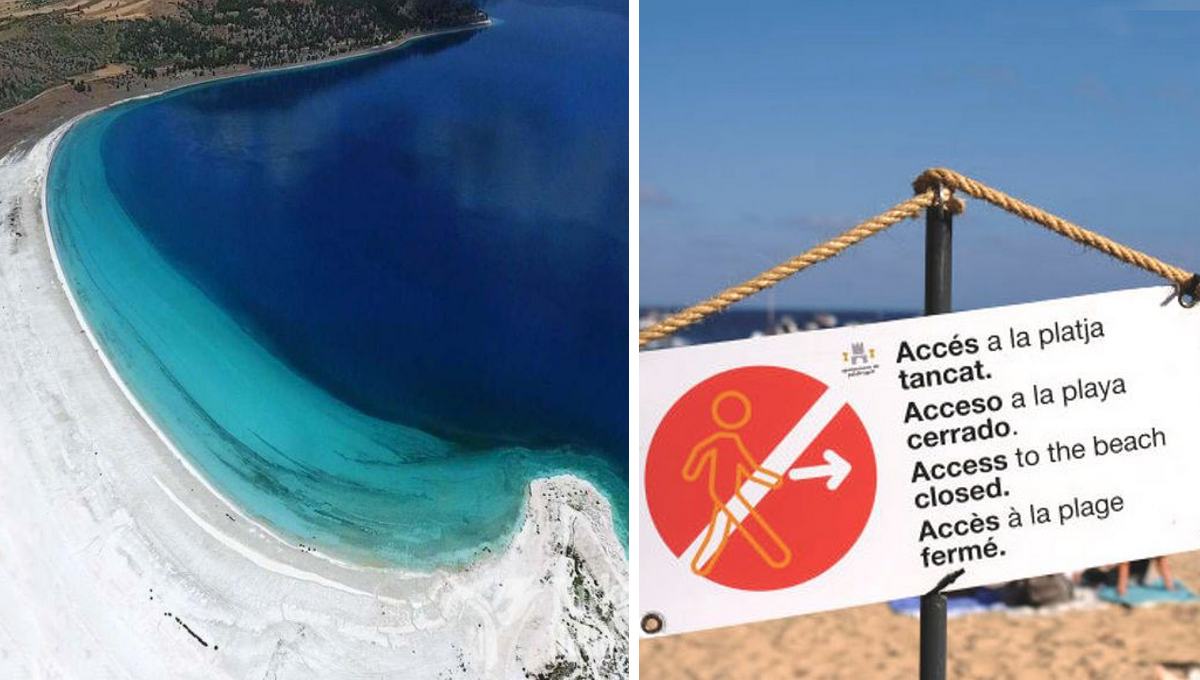Turkish authorities were concerned about the state of Paradise Lake, which is also a protected natural area, and issued a ban on swimming there. It is a popular tourist destination, Salda Reservoir – a crater lake in southwestern Turkey.
Environmentalists have sounded the alarm because they found a high content of chemicals in the water, which are released by sunscreens and even shampoos used by vacationers. All this led to heavy pollution of the lake. In this regard, the scientific advisor of the Turkish Conservation Association, Dr. Erol Kesici, suggested that the same protection measures be applied to the reservoir as applied to the famous Pamukkale springs. “We must love Lake Salda only with our eyes,” he said.
White dunes and turquoise water attract tourists, especially since the road by car from Antalya takes about 2-2.5 hours. In addition, the lake has gained popularity due to its uniqueness and comparison with the crater on Mars: what vacationers take for sand is a deposit of minerals. They are formed by stromatolites – sedimentary formations that have arisen as a result of the activity of cyanobacteria found in rocks that are about 3.5 billion years old. Because of the stromatolites, the Turkish lake was once compared to the White Rock, located in Pollack Crater on Mars – their structures are similar in appearance. The crater was considered a parched lake with sediment-like sediments similar to Salda Lake, noting that there are only two such sites on Earth: the second is in northern Canada.
Recent observations by scientists have shown that chemicals used by humans remain in the lake. This led to a change in the population of microorganisms and bacteria in the reservoir. In addition, waste is changing the quality and color of water – the Turkish Maldives may lose its “golden” status.
If not for the ban, then this summer the deepest freshwater lake in Turkey, surrounded by mountains, again met with a lot of tourists. In a statement from the Association for the Protection of Nature, environmentalists put forward strong arguments in favor of closing the lake and beaches from vacationers: “Lake Salda – an indoor pool. Pollution entering the lake should not be repeated. Sweat, sunscreen, soap, shampoo, and dozens of waste from those who bathe in the lake, lead to heavy pollution. That is why people should not enter the water in the lake. Accumulated contaminants settle at the bottom of the lake and form hydrogen sulfide, methane, and ammonia, which are toxic to living things. Our reservoir is a world heritage site, we want full protection. ”
In addition, activists passed a demand to the authorities to prohibit tourists from having picnics, lighting fires, entering the area by car, and construction companies – to erect any buildings. According to the scientist, before 1970 the depth of the lake was 196 meters, but in November 2021 measurements were made and it turned out that the lake is getting shallower – the depth was only 174 meters. Scientists have explained this by the fact that over the past five years, the lake has faced serious problems due to intense tourist pressure and anthropogenic impact around it.
Help: Lake Salda is a body of natural water, fed only by rainfall. It is of tectonic origin, located among the mountains at an altitude of about 1200 m above sea level in southwestern Turkey, on the border of the Aeshilov area of Mullah Burdur. The surface area of the lake is 45 square meters. For comparison: the area of Baikal – 31.5 sq. Km.
The lake is a popular tourist destination, especially because of the hydromagnesite mineral, which is believed to be a cure for some dermatological diseases. It is home to fish and birds, including quail, hares, foxes, wild boars, and wild ducks. White sandy beaches, clear water and seven crystal white islands in the lake complete the paradise landscape.

